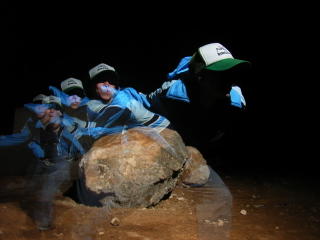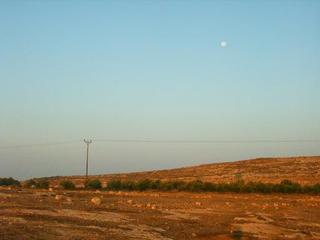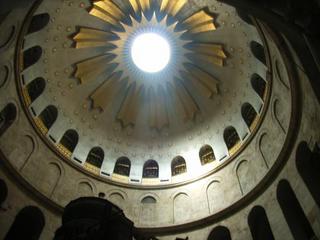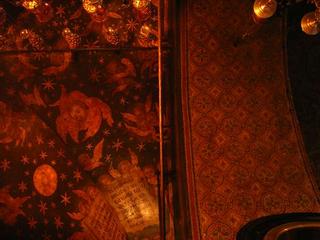It's a thin gash of light emerging over the eastern hills as we wake up in our little hut in Qawawis. There are three of us here; there is David (Canadian), Maraya (American) and there is me, and the three of us groan as we sift through our bags in the early morning light. It's a biting chill coming through the doorway, and the clatter of hooves on rocks as the sheep head out to graze. We hoist our packs, shake the hands of our hosts, shower 'shukrans' upon the village. And we walk across the valley, mounting the barriers of the settler road, and head, gradually, back towards Jerusalem.
Near Bethlehem we run into a crowd. Early this morning the Israelis have announced that as it is Friday, all Palestinians over the age of 45 will be allowed today into Jerusalem to pray at al-Aqsa mosque. Buses and service taxis are crammed with men and women carrying green ID wallets, all excited about their day trip to al-Quds. But here we are at the checkpoint, and suddenly, the army are turning people away. 'A change in orders,' they say. The crowds swell, people waiting, filled with disappointment, confusion, frustration. And still, the thin hope that if they just keep on waiting...
We rush into Jerusalem and get lip balm, bread products, fresh clothes. Then out again, northwards this time, past the massive grey wall looming over the outskirts of Ramallah, its dark edges interupted by the reinforced glass of the observation towers. Past the jagged yellow rock cliffs, past the Arab villages teired on the slopes, past the Legoland developments of the Israeli settlers perched at the tops of hills, ringed with high fences and razor wire.
At Huwara checkpoint Palestianians are freely walking across into Nablus, but we are stopped by a frowning soldier with stubble. "Nablus is closed for all tourists" he tells us. "I cannot let you in". We tell him we are visiting a friend at the university, going for dinner, that we know very well that Nablus is not closed. We sit on our bags there. We open the paper and begin to read, we start chatting to soldiers, we make phone calls, we just hang out. After an hour he gives up and lets us through - he is about to go off duty and can't hand over control of the checkpoint with these random tourists just sitting there. "Don't go out at night" he tells us, "And go back to Jerusalem tomorrow". We nod and pass through.
The taxi gets directions from our co-ordinator by cell phone, but manages to take us to the wrong place anyway. We have taken a dirt road up to a settler road, and we have been left here, by a small army base, below a settlement surrounded by pine trees. We look about, hike up a nearby hill, and then realise just how lost we are. The best bet, we decide, is to hike back down the dirt road we came along, towards Salim village which is where we are meant to be. A shout from the military base. Apparently this is a military only road. We should not be here. Why are we here? We frown and act innocent. "Oh we're just trying to find Salim village", we say. "I guess we're a little bit lost?"
They detain us for an hour while they work out what to do with us. They give us seats in the shade and supply us with juice and coke, and witty conversation about how dangerous the Arabs are, and how we should go immediately back to Jerusalem. Eventually they have an idea, which is to put us on a red settler bus, which is coming down from the hilltop. The bus stops, the door opens, we say to the driver "Salim?"
"I WILL NOT DRIVE YOU TO SALIM!" His face is red and pinched. "GET OFF THE BUS! GET OFF THE BUS! GOODBYE!"
The soldiers shake their heads and grin. "Thought that might happen" they say.
So they let us go, and we are walking to Salim, down the settler road, between the dynamite walls, above the valley of Nablus. Cars fly past, bearded Jews in yalmulkes stare at us, confused. One stops and asks us in Hebrew what we are doing here. No problem, we say. Shabat Shalom.
Eventually we find the group, who have been picking olives all day. We are exhausted, and so are they, and we pile into the taxi, to the apartment.
The ISM Nablus apartment is in Balata refugee camp, a sardine can area of 35,000 people crammed in narrow roads and bullet scarred cement buildings. These are refugees, and families of refugees, from both 1948 and 1967. The streets are wallpapered with colourful posters of martyrs weilding automatic weapons. There are a hundred hands stuck out to greet us, Ahlan, Hello, Whats your name, where you from? Small patches of sky hidden behind triangular flags. Kids with wide smiles, weilding plastic guns. Little Karim wants to be a fighter when he grows up. Ahmed wants to represent Palestine in an Olympic soccer team. Dani? Also hoping to be a fighter. Their eyes sparkle as they look up at us, this afternoon.
The next morning we head back into the olive fields. Today we are harvesting a section of land which is close to a settler outpost, high up the gravel road. As a result the villagers have not been able to access this land for five years, and the olives are small and scarce. At the fields, the army have arrived, they are pushing the families back, telling them to leave their land, saying they do not have proper authorisation to harvest this land today ("We cannot let Arabs do whatever they want" the commander tells us "or we will have mayhem"). We argue that it is their land, that these are their trees and that indeed permission has been granted, by the District Co-ordination Office. "This is not their land," the commander continues "one Israel for all Israelis. This is Israeli land". The army guys have their fingers on their triggers. We try filming, we try taking photos, and they threaten to smash our cameras. We take photos from our hips. Some DCO guys arrive, and it turns out, woah, they had permission to harvest here after all. They search the farmers, and let them go to the fields.
We pick for a number of hours, with soliders sitting on the hilltops, hidden behind tall grass, watching us. They see a Palestian flag wristband on a Swedish guys arm, they spit that such a sight disgusts them, that he should go back to Europe. They find out Maraya is Jewish American, they call her the lost Jew, tell her she should be ashamed. "I just think after all that they have been through, Jewish people should know first hand how to treat people with common decency and respect" she says to the commander. His reply: "Arabs are not people".
But we farm, and they watch, boiling in their anger, and we head down the hill again. The villagers have managed to get their olives, and we all all happy enough today.
Every day we head out and pick olives, our hands dry and cracked from pulling along dusty branches, the olives falling with dull thocks on the plastic sheets spread below the trees. We climb up the trunks of these little trees, we balance on the forked branches, our arms are scratched and marked, the sun is warm and strong. We hide behind trees to eat lunch, so as not to eat in front of the villagers, who are fasting for Ramadan. The army passes by in thick wheeled Hummers, in white jeeps, they stop and watch a while and move on. It is tiring work, it is boring work, at times we even wish guiltily for something exciting to happen again, but then we remind ourselves that our being here is more preventative than reactive. That maybe if we weren't here, the villagers would be turned away, again. That despite the seeming peacefulness of this place, despite the wide beautiful vista of the hillslopes of Nablus, the warm skies, the gorgeous valleys and the laughter of the children, this is a place which is filled with hatred, filled with sorrow, and filled with fear.
So, we work, and the olives fall, plod, plod, plod, plodplod, plod.
Often, at night, the army will make another incursion into Balata, or into Nablus, to open fire on the fighters, who patrol the streets in polished cars with large guns at the ready. The fighters will return fire, and the smell of gunpowder will rest in the air until dawn. If someone is killed, the mosque will announce it over the loudspeaker. We stay inside the house, waiting - we will only go out if we are called by medical teams. So far we have not been called.
You can read about our recent actions, and see a few pictures here, you know:
http://www.palsolidarity.org/main/2005/10/25/begining-of-olive-harvest-campaign-nablus-region/
and about some recent happenings in Qawawis, here:
http://www.palsolidarity.org/main/2005/09/18/hebron-settlers-plant-home-made-landmines/
Oh and I have a cellphone here:
+972 546 478 139
Your occasional text message is like buttermilk cookies and a warm purring cat on my lap.
Good friends, may you all always know peace, and always work as strong as you can that others may one day know it too.
Goodnight.




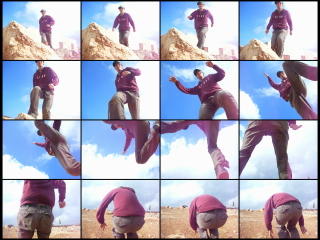 me
me